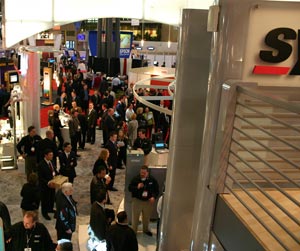News
Self-service figures prominently at NRF 'Big Show'
Self-service technology pervaded The National Retail Federation's 95th Annual Convention and Expo when its exhibition hall sprang to life Monday. From massive high-tech installations by established industry megaliths, to the tiny booths of cutting edge start-ups, self-service innovators at New York City's Jacob K. Javitz Convention Center plied their wares to throngs of retailers seeking better ROI.
January 22, 2006
Self-service technology pervaded The National Retail Federation's 95th Annual Convention and Expo when its exhibition hall sprang to life Monday. From massive high-tech installations by established industry megaliths, to the tiny booths of cutting edge start-ups, self-service innovators at New York City's Jacob K. Javitz Convention Center plied their wares to throngs of retailers seeking better ROI.
Among the flashier cost-saving gadgets at this year's show were biometric input devices. Control Module, a 30-year-old company originally in the barcode business, demonstrated its line of fingerprint recognition devices. When paired with Cetec's self-service human resources software, Control Module's systems could store employees' fingerprints; track and control their door, computer or machine access; send them personalized messages, and automate typical HR activities - like tracking tardiness or enabling vacation scheduling. Its Windows-based Touchtime units, deployed in high-security environments like the Wynn Las Vegas resort casino, enabled users who don't otherwise have windows workstation computers to view employee records, and even 401(k) portfolios.
Fingers were also the new way to pay, even while wrapped around cell phones or PDAs. MobileLime, a young company proffering cell phone-based alternatives to loyalty and debit cards, demonstrated a system that, among other things, allowed customers to bypass pharmacy counter lines by paying through their cell phones. Unix owner SCO, meanwhile, showed its off portable supplier-ordering software for the TREO (a PDA/cell phone combo similar to a Blackberry) called Me Inc. Me Inc, currently used by Musco Food Corporation, allows suppliers to order and pay for wholesale goods directly through their employees' TREOs.
Control Module's biometric employee enrollment process took less than five minutes and produced data that could be stored by popular retail database software. The fingerprint information, stored in the form of templates tracking random points on the user's finger, could not be used to reproduce the user's fingerprint - which many consumers fear could be shared with privately distributed databases or government agencies. What's more, the scanner tracked the conductivity of the finger touching the pad, meaning only a live (i.e. attached) finger could activate the unit.
Self-service systems integrator Agilysys Inc. demonstrated a wide array of recently deployed grocery and retail solutions. Terry Kasen, Agilysys business unit director for industry solutions, voiced a sentiment repeated by many self-service developers at The Big Show.
 |
| Visitors crowd the mammoth Symbol pavilion at the annual National Retail Federation exposition, in New York City. |
"Our approach to the self-service space is to be the innovator," he said.
Agilysys's grocery kiosk, built in partnership with Symbol, Frank Mayer and Associates, and St. Clair Interactive for grocery chain Giant-Carlysle, integrated ordering, loyalty and marketing applications; among them, software to instantly compare the individual's purchase records, referenced from his or her loyalty card, to current product specials. The system could display current specials that records indicated the customer might want. If the customer selected one on the Symbol touchscreen, the machine showed a map with directions to the product's shelf location.
Agilysys also demonstrated remote retail management PDAs, redubbed EDAs (enterprise digital assistants), that allowed supervisors to monitor and manage register transactions remotely, and a portable hand-held checkout system used by shoppers to bypass checkout lanes. The portable self-checkout could be added to existing U-Scans.
Symbol hosted a two-story booth replete with self-service solutions and crowds of end-users fixated upon them. They, in conjunction with Vue Technology, showcased a semi-real-time, RFID-enabled, inventory control network in its "Store of the Future." The system tracked individual products, tagged with RFID, from warehouse to POS. Used in full, the system could track items loaded onto RFID scanning fork lifts, into store back rooms equipped with their DC 600 RFID portal system, across RFID "smart shelves" and into customers' hands. The system relayed scanned data back to its Intelimanager tracking software which, Vue spokesman David Nesbitt said, could literally update inventory minute-by-minute - rather than the infrequent, inaccurate manual processes commonly in use. The system was test-marketed by major retailers, including Best Buy. Symbol and Vue plan to see commercial deployments in 2006.
"We're convinced they are real retail applications that can provide real ROI today," said Verlin Youd, Symbol vice president of retail industry solutions.










